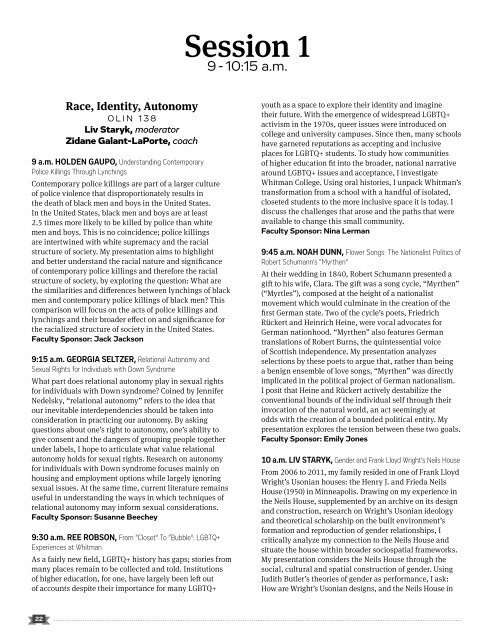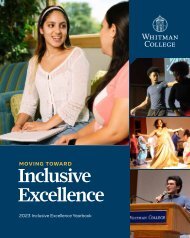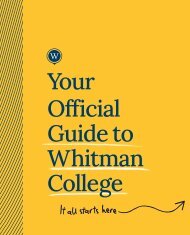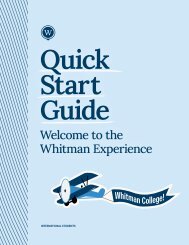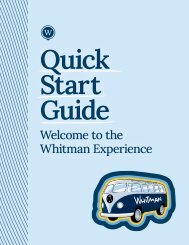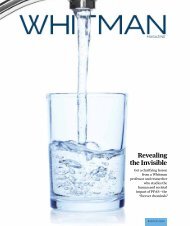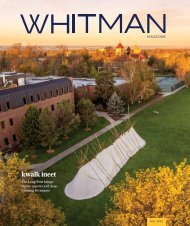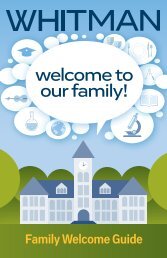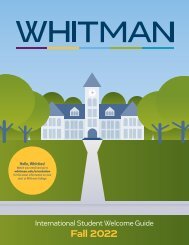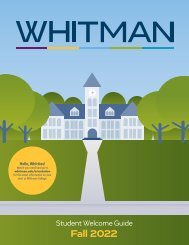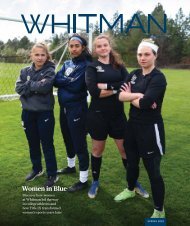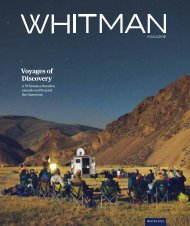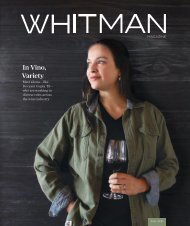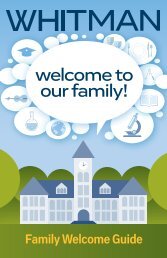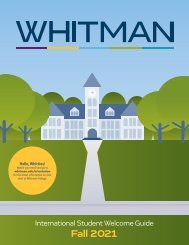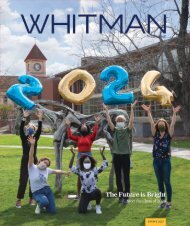Whitman College Undergraduate Conference Program 2020
Whitman College 2020 Undergraduate Conference Program
Whitman College 2020 Undergraduate Conference Program
Create successful ePaper yourself
Turn your PDF publications into a flip-book with our unique Google optimized e-Paper software.
Session 1<br />
9 - 10:15 a.m.<br />
Race, Identity, Autonomy<br />
OLIN 138<br />
Liv Staryk, moderator<br />
Zidane Galant-LaPorte, coach<br />
9 a.m. HOLDEN GAUPO, Understanding Contemporary<br />
Police Killings Through Lynchings<br />
Contemporary police killings are part of a larger culture<br />
of police violence that disproportionately results in<br />
the death of black men and boys in the United States.<br />
In the United States, black men and boys are at least<br />
2.5 times more likely to be killed by police than white<br />
men and boys. This is no coincidence; police killings<br />
are intertwined with white supremacy and the racial<br />
structure of society. My presentation aims to highlight<br />
and better understand the racial nature and significance<br />
of contemporary police killings and therefore the racial<br />
structure of society, by exploring the question: What are<br />
the similarities and differences between lynchings of black<br />
men and contemporary police killings of black men? This<br />
comparison will focus on the acts of police killings and<br />
lynchings and their broader effect on and significance for<br />
the racialized structure of society in the United States.<br />
Faculty Sponsor: Jack Jackson<br />
9:15 a.m. GEORGIA SELTZER, Relational Autonomy and<br />
Sexual Rights for Individuals with Down Syndrome<br />
What part does relational autonomy play in sexual rights<br />
for individuals with Down syndrome? Coined by Jennifer<br />
Nedelsky, “relational autonomy” refers to the idea that<br />
our inevitable interdependencies should be taken into<br />
consideration in practicing our autonomy. By asking<br />
questions about one’s right to autonomy, one’s ability to<br />
give consent and the dangers of grouping people together<br />
under labels, I hope to articulate what value relational<br />
autonomy holds for sexual rights. Research on autonomy<br />
for individuals with Down syndrome focuses mainly on<br />
housing and employment options while largely ignoring<br />
sexual issues. At the same time, current literature remains<br />
useful in understanding the ways in which techniques of<br />
relational autonomy may inform sexual considerations.<br />
Faculty Sponsor: Susanne Beechey<br />
9:30 a.m. REE ROBSON, From “Closet” To “Bubble”: LGBTQ+<br />
Experiences at <strong>Whitman</strong><br />
As a fairly new field, LGBTQ+ history has gaps; stories from<br />
many places remain to be collected and told. Institutions<br />
of higher education, for one, have largely been left out<br />
of accounts despite their importance for many LGBTQ+<br />
youth as a space to explore their identity and imagine<br />
their future. With the emergence of widespread LGBTQ+<br />
activism in the 1970s, queer issues were introduced on<br />
college and university campuses. Since then, many schools<br />
have garnered reputations as accepting and inclusive<br />
places for LGBTQ+ students. To study how communities<br />
of higher education fit into the broader, national narrative<br />
around LGBTQ+ issues and acceptance, I investigate<br />
<strong>Whitman</strong> <strong>College</strong>. Using oral histories, I unpack <strong>Whitman</strong>’s<br />
transformation from a school with a handful of isolated,<br />
closeted students to the more inclusive space it is today. I<br />
discuss the challenges that arose and the paths that were<br />
available to change this small community.<br />
Faculty Sponsor: Nina Lerman<br />
9:45 a.m. NOAH DUNN, Flower Songs: The Nationalist Politics of<br />
Robert Schumann’s “Myrthen”<br />
At their wedding in 1840, Robert Schumann presented a<br />
gift to his wife, Clara. The gift was a song cycle, “Myrthen”<br />
(“Myrtles”), composed at the height of a nationalist<br />
movement which would culminate in the creation of the<br />
first German state. Two of the cycle’s poets, Friedrich<br />
Rückert and Heinrich Heine, were vocal advocates for<br />
German nationhood. “Myrthen” also features German<br />
translations of Robert Burns, the quintessential voice<br />
of Scottish independence. My presentation analyzes<br />
selections by these poets to argue that, rather than being<br />
a benign ensemble of love songs, “Myrthen” was directly<br />
implicated in the political project of German nationalism.<br />
I posit that Heine and Rückert actively destabilize the<br />
conventional bounds of the individual self through their<br />
invocation of the natural world, an act seemingly at<br />
odds with the creation of a bounded political entity. My<br />
presentation explores the tension between these two goals.<br />
Faculty Sponsor: Emily Jones<br />
10 a.m. LIV STARYK, Gender and Frank Lloyd Wright’s Neils House<br />
From 2006 to 2011, my family resided in one of Frank Lloyd<br />
Wright’s Usonian houses: the Henry J. and Frieda Neils<br />
House (1950) in Minneapolis. Drawing on my experience in<br />
the Neils House, supplemented by an archive on its design<br />
and construction, research on Wright’s Usonian ideology<br />
and theoretical scholarship on the built environment’s<br />
formation and reproduction of gender relationships, I<br />
critically analyze my connection to the Neils House and<br />
situate the house within broader sociospatial frameworks.<br />
My presentation considers the Neils House through the<br />
social, cultural and spatial construction of gender. Using<br />
Judith Butler’s theories of gender as performance, I ask:<br />
How are Wright’s Usonian designs, and the Neils House in<br />
22 23


